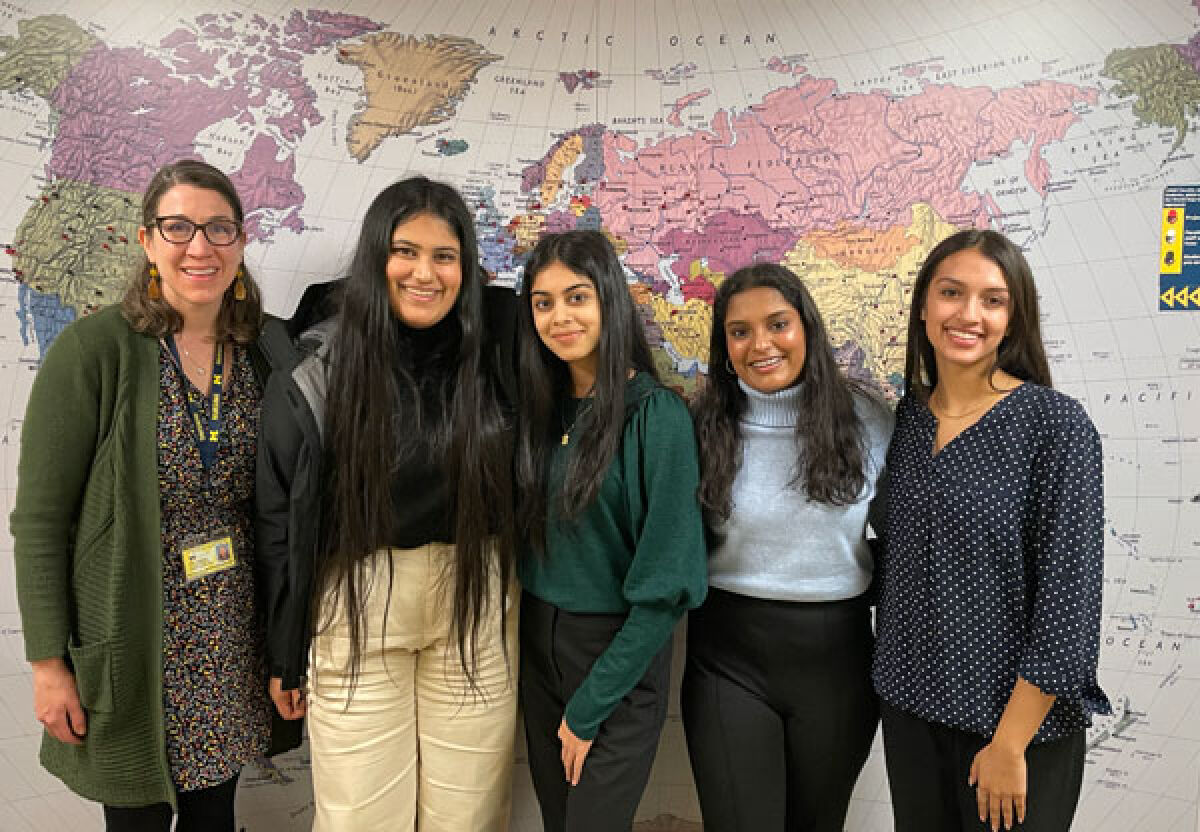TROY — Two Troy students are trying to promote positive change after starting their own nonprofit aimed at fighting human trafficking.
Alisha Malik and Aarya Undemane began working on Breaking the Bounds two years ago, starting it at their school, International Academy East in Troy.
“We established this back in August of 2021,” explained Malik. “We created this nonprofit because human trafficking is the second largest crime industry under drugs. It’s growing in our community, and we wanted to inform people and keep them safe. Before we created this campaign to start a nonprofit, we needed to research and find information so we wouldn’t misinform people. We wanted to educate people and reach a larger audience beyond our immediate community. We also wanted to educate ourselves. Some of our partners in this were our teachers and principals, and they let us talk about this in the classroom. We spoke with survivors and victims and other nonprofits.”
The pair have been working with experts on the subject of human trafficking and figuring out ways they can bring the fight to a local level.
“We take part in the Stop the Demand Project. Its CEO, Sophia Fisher, met with us, and we learned a lot through her. She also gave us some educational resources,” Malik said. “We (also) went to the University of Michigan last week and spoke with Dr. Michelle Munro-Kramer. She is an assistant professor of nursing there, and we wanted to talk with her because she has a lot of experience with human trafficking and she helps run the university’s anti-human-trafficking initiative.”
Fisher said that seeing young people take action against human trafficking was incredibly encouraging.
“Working with people in this space and acting out on their desire to make a difference warms my heart,” she said. “When I spoke with the two young women who started Breaking the Bounds, I could tell they were super eager to do something. Human trafficking is a space that is very dark and has a lot of weight to it. It isn’t to be taken lightly. They just wanted to listen and know how they can help.”
Malik said the key thing Breaking the Bounds is doing now is trying to raise awareness in Oakland County.
“We met with a survivor named Alison. She was a victim of human trafficking. She told us about her experiences and the terror and abuse she suffered. We shared her story with her permission, because if people wouldn’t listen to us, they would listen to someone who had lived through it.”
Fisher said raising awareness locally is a crucial part in combating human trafficking.
“This wasn’t even federally recognized as a crime until 20 years ago,” said Fisher. “We lack a lot of resources at the local level. The key right now is educating people about its realities. Many people don’t know what it looks like. A lot of people think about how it occurs in the ‘Taken’ films. In the films, it’s where women are taken by complete strangers. My work has shown that it is often someone they know, whether it’s a family member or employer or someone else.”
She added that local organizations such as Breaking the Bounds are important because while there are several national groups that address human trafficking, few are able to devote resources to local efforts like awareness campaigns.
“Supporting organizations like Breaking the Bounds is where it starts to fight human trafficking,” Fisher said. “It can make all the difference. There are fantastic groups working at the national level, but I think the local level is where we’re actually going to combat human trafficking. Supporting them financially, educating yourself or hearing the stories can all make a difference.”
As Breaking the Bounds grows, Malik said that she and Undemane hope to start addressing larger audiences and working over a larger geographic area.
“We want to get more followers and a larger audience,” said Malik. “We then hope to take it to a wider, hopefully global level. We want to grow our team and we also want to start doing events with guest speakers such as experts and survivors so they can talk to the community.”
Both Malik and Fisher pointed out that one of the biggest misconceptions about the topic is that human trafficking happens far away. Tragically, it takes place all over the country.
“So much of the talk about trafficking is on the national level,” said Fisher. “We can’t turn a blind eye to what is happening in our communities. It’s more than talking about it; it’s sharing stories like mothers selling their children for drug money or people getting exploited for a work visa. A lot of people want to do something but have no idea where to start. They might think it’s only happening at the border or far away, and that is false. One of the most important things people can do is share the realities and horrors of human trafficking.”
Malik also hopes to inform people about what to look for and warning signs that could point to someone being trafficked.
“If someone suffers a sudden or dramatic change in their attitudes or emotions, it could be a sign that they are being exploited,” she said. “A lack of interest in what they used to be excited about or negative changes to their health can all be signs of human trafficking.”
Those wishing to reach out for help in situations about human trafficking can contact the National Human Trafficking Hotline at (888) 373-7888.
 Publication select ▼
Publication select ▼


























